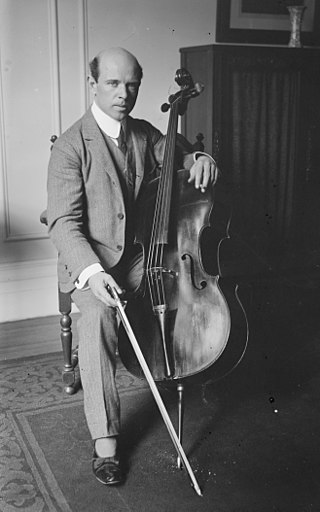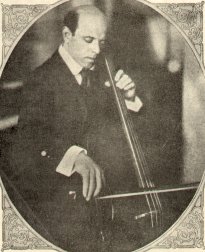Related Research Articles

Pau Casals i Defilló, known in English as Pablo Casals, was a Catalan and Puerto Rican cellist, composer, and conductor. He made many recordings throughout his career of solo, chamber, and orchestral music, including some as conductor, but he is perhaps best remembered for the recordings he made of the Cello Suites by Bach. He was awarded the Presidential Medal of Freedom in 1963 by President John F. Kennedy.

A concert is a live music performance in front of an audience. The performance may be carried by a single musician, sometimes then called a recital, or by a musical ensemble, such as an orchestra, choir, or band. Concerts are held in a wide variety and size of settings, from private houses and small nightclubs, dedicated concert halls, amphitheatres and parks, to large multipurpose buildings, such as arenas and stadiums. Indoor concerts held in the largest venues are sometimes called arena concerts or amphitheatre concerts. Informal names for a concert include show and gig.

Pablo Martín Melitón de Sarasate y Navascués, commonly known as Pablo de Sarasate, was a Spanish (Navarrese) violinist, composer and conductor of the Romantic period. His best known works include Zigeunerweisen, the Spanish Dances, and the Carmen Fantasy.
Christian Ferras was a French violinist.
Erika Raum is a Canadian violinist.
Sándor Végh was a Hungarian, later French, violinist and conductor. He was best known as one of the great chamber music violinists of the twentieth century.

Prades is a subprefecture of the Pyrénées-Orientales department in the Occitanie region of Southern France. In 2021, the commune had a population of 6,124. Prades is the capital of the historical Conflent comarca. Its inhabitants are called Pradéens and Pradéennes in French and Pradencs and Pradenques in Catalan. It is also the hometown of Jean Castex, who served as Prime Minister of France from 2020 to 2022.

The Casals Festival is a classical music event celebrated every year in San Juan, Puerto Rico, in honor of classical musician Pablo Casals.
Jerzy "Jurek" Dybał is a Polish conductor and solo double-bassist. Since 2013, he is the director of the International Krzysztof Penderecki Festival in Zabrze, Poland. Since 2014, he is the director of orchestra at Sinfonietta Cracovia in Kraków.

Abraham Alexander Schneider was a violinist, conductor and educator. Born to a Jewish family in Vilnius, Lithuania, he later moved to the United States as a member of the Budapest String Quartet.

Enrique Arturo Diemecke is a Mexican conductor, violinist and composer. He is currently the Artistic General Director of the Teatro Colón in Buenos Aires and music director of the Buenos Aires Philharmonic and the Flint Symphony Orchestra in Michigan, United States.

Ida Levin was an American concert violinist. Levin taught at the Sander Vegh International Chamber Music Academy in Prague and was a former faculty member of Harvard University, the Colburn School and the European Mozart Academy.

Tongyeong International Music Festival, abbreviated TIMF, is an annual music festival held in Tongyeong, South Gyeongsang Province, South Korea. Considering the classification between ethnic and artistic categories, TIMF may be classified into one of Korea's leading arts and music festivals which is specialized in western music, i.e. with a variety of style and genre, such as contemporary, early(baroque), classical, romantic, traditional, symphonic, chamber or ensemble, operatic or music theater. In spite of its various appetite for genre, TIMF is usually known as being strong in contemporary program of western style music. The artistic director is the composer Unsuk Chin.

Ernst Wallfisch was a prominent viola soloist, recording artist and pedagogue, primarily remembered along with his wife, pianist Lory Wallfisch, as partners of the Wallfisch Duo.
Fernando Egozcue is an Argentinian guitarist and composer.
The ISANGYUN Competition is an international music competition, held annually in Tongyeong, South Korea. It commemorates Isang Yun (1917–1995), a Korean composer who was born in Tongyeong and later settled in Germany. The competition was established in 2003 as the Gyeongnam International Music Competition, and renamed to ISANGYUN Competition in 2008. It consists of a three-year "cycle", where each year, or "edition", consists of a different instrument in the rotation: cello, piano, and violin.
Enric Casals i Defilló, brother of Pablo Casals, was a Spanish violinist, composer and conductor.

South Club (Korean: 사우스클럽) is a South Korean band formed in 2017 by singer Nam Tae-hyun. The band's current line-up consists of four members: leader, vocalist, guitarist, composer and producer Nam Tae-hyun, bassist Jung Hoe-Min, drummer Lee Dong-Geun and guitarist Kang Min-Jun. South Club debuted with the release of their first single, "Hug Me", on May 26, 2017 which was also included in their first EP, 90.
Christian Altenburger is an Austrian classical violinist.

The Sociedad de Cuartetos de Madrid, 1863–1894, was an organization that provided concert series with an educational approach. They attempted to save chamber music from fading into oblivion since Italian opera and Zarzuela dominated Spanish concert life. Founded by violinist Jesús de Monasterio and pianist Juan María Guelbenzu Fernández in 1863, this society contributed significantly to the circulation and interest of chamber music in the Iberian Peninsula. The quality of the music, over their thirty-one seasons, was always praised. They also exposed a lack of interest by the majority of the Spanish composers for the chamber music genre during this time. Despite their great perseverance and increasing success, the society's activities concluded on January 5, 1894, due to health problems that troubled Monasterio for several seasons prior. The Society of Quartets represents the first serious and lasting initiative for the circulation of chamber music in 19th-century Spain. Their activities carried out through thirty-one concert seasons in Madrid as well as other concerts offered outside the capital.
References
- ↑ "Festival Pablo Casals". France Festivals. Retrieved 2018-07-04.
- ↑ El Pessebre (France Musique)
- ↑ "Thorsten Encke / official website". thorsten-encke.de. Retrieved 2018-07-04.
- ↑ "Hee Yun Kim, Composer". heeyunkim.net. Retrieved 2018-07-04.